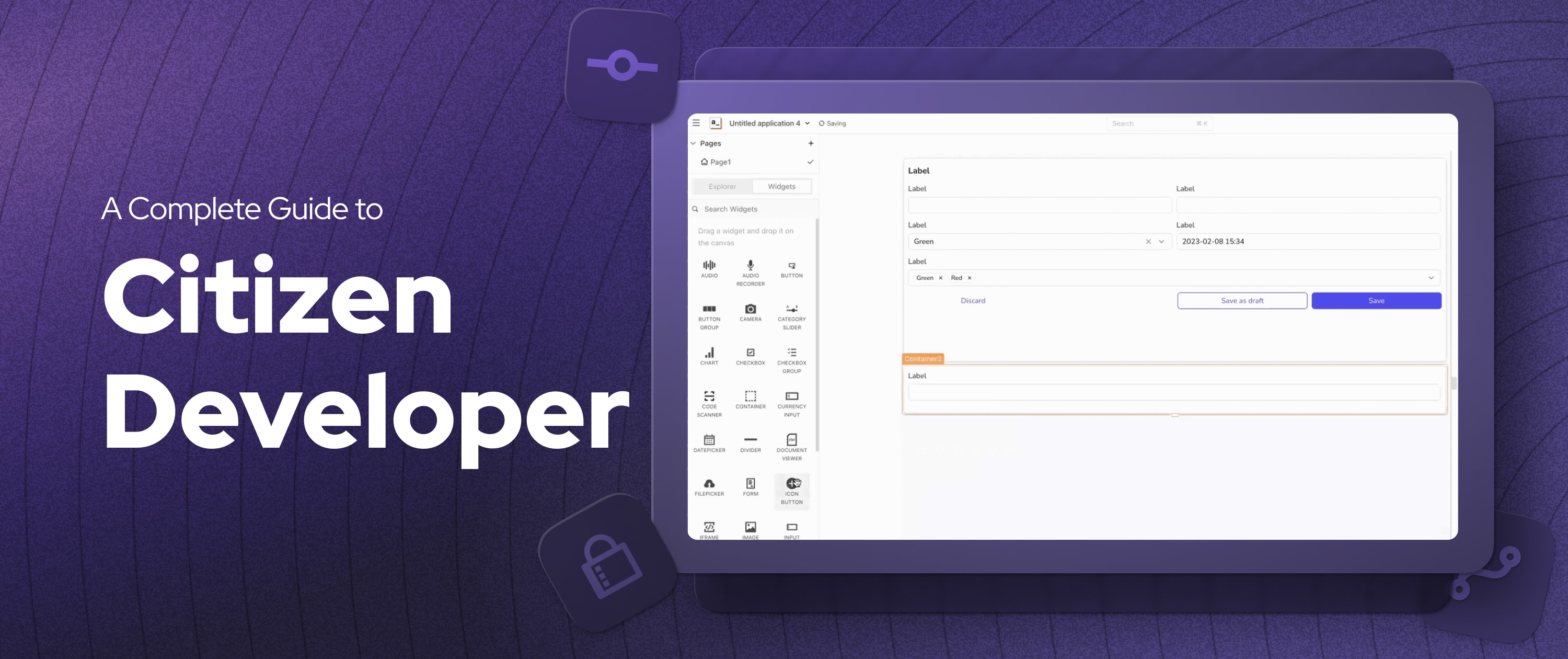What is a Citizen Developer? A Detailed Guide


Are you struggling to create apps quickly without relying on IT support? Do you want to cut down on the high costs of hiring professional developers?
If so, you might need citizen developers in your organization.
Citizen developers use low-code or no-code platforms to build apps easily. In fact, according to Fortune Business Insights, the global low-code development platform market will grow from USD 28.75 billion in 2024 to USD 264.40 billion by 2032. This growth highlights the increasing importance of these platforms.
But what exactly is a citizen developer? Let's explore this concept further.
What is a citizen developer?
Citizen developers are non-IT professionals who create and customize business applications using low-code or no-code development platforms. They have little to no coding knowledge.
Citizen individuals operate within the organization to develop solutions that streamline processes for departments like sales, marketing, operations, and HR.
Citizen developers can create apps without coding using no-code tools like Bubble and Wix. They can also use low-code tools like Appsmith, Mendix, and Retool, which allow more flexibility and functionality.
However, when using low-code tools, citizen developers can develop most parts of the app but might need the help of a professional developer to build and deploy the application fully.
For example:
A support agent at an e-commerce company requires a dashboard to track data from past orders. With a no-code solution, the support agent could create a basic dashboard independently.
With a low-code solution, a citizen developer can build a customized and robust dashboard with minimal assistance from the IT department. For more complex functionalities and integrations, the citizen developer might need the help of a professional developer.
This approach results in collaboration, reduces the time developers need to invest and ensures good development practices are maintained while speeding up the process.
Here is a comparative table highlighting the key differences between successful citizen developers and professional developers. It will help you understand citizen developers' roles and the differences between them and professional developers.
How do professional developers differ from citizen developers?
Let's understand the key differences between professional and citizen developers to understand their roles in app development better.
Aspect | Citizen Developers | Professional Developers |
Education | Citizen developers lack formal training in app development, broadening accessibility to app development within organizations. | Professional developers often hold technical degrees or specializations, equipping them with deep expertise in software development. |
Expertise | Citizen developers possess basic app development skills that are suitable for simpler applications. | Professional developers with advanced coding skills and a comprehensive understanding of software development processes characterize professional developers. |
Tools Used | Utilize no-code and low-code platforms that simplify the application development process through intuitive templates and interfaces. | Use many tools, including low-code platforms for efficiency and traditional programming environments for more complex needs. |
Complexity of Applications | Citizen developers focus on simpler applications that optimize internal business processes. | Professional developers can develop complex, scalable, and performance-critical applications, often serving external users. |
Intended Use-Case | Often, citizen developers can build tools like admin panels and CRUD interfaces primarily for internal use within their organization. | Develop user or customer-facing applications primarily for external use, enhancing customer interaction and meeting external business demands. |
With these differences in mind, consider why citizen developers are essential for businesses.
Ready to transform your business with low-code solutions?
Appsmith is here to help. Our user-friendly low-code platform enables your team to develop custom applications with minimal coding knowledge.
Why are citizen developers important for businesses?
Let’s understand the top four reasons why citizen developers must use low-code platforms and how it is important for organizational success.
Low-code platforms allow professional and citizen developers to collaborate. Developers often build the core structure of the apps, and citizen developers can then refine and enhance them according to their practical needs.
Low-code platforms often reduce the need for extensive coding knowledge, allowing citizen developers to maintain and scale applications. This can result in cost savings, as businesses might not need to hire additional, specialized technical staff.
Citizen developers are typically familiar with the company's strategies, processes, and requirements. This understanding can save time as it reduces the need for extensive training or explanation.
Low-code platforms allow developers to access ready-to-use functionalities such as drag-and-drop, templates, and widgets, which help them build apps faster and launch them in the market.
To further highlight the value of these platforms, here's a testimonial from Atheneum, who is using Appsmith for rapid delivery.
“”"I tried several low code solutions and Appsmith was the clear winner for our particular use case. The speed with which you can put together an internal tool is incredible. We’ve integrated it with our data warehouse, with Microsoft Teams, and with our logging, monitoring, and metrics infrastructure." - David Adams, CTO at Atheneum.ai
5 top key platforms for citizen developers
The following are the different citizen development tools and platforms that citizen developers can utilize for citizen development projects according to their project requirements.
Platform | Key Features | Use Cases | Pricing |
Appsmith | - Drag and drop widgets - Code customization - Git-based version control - Built-in JS code editor - Import JS libraries - AI integration in apps | - Customer experience dashboard - AI-powered assistant tool - Data analytics tool - Issue tracker app - SQL admin panel | $40/month for 100 hours of usage. Additional usage at $0.4/ hour |
Microsoft Power Apps | - Connectors - On-premises data gateway - Multi-factor authentication | - Workflow management - Financial management - Cost control system | $20/user/month |
Outsystems | - Application Templates - AI-assisted development - Pre-built connectors | - Customer core systems - Internal business apps - Virtual care systems | Starts at $36,300/year |
Retool | - Activity dashboard - Customizable forms - Collaboration tools | - Customer support dashboard - Customer notification system - Event management tool | $50/month per developer, $15/month per end-user |
Mendix | - Ready-to-use components - AI-Assistance - Real-time notifications | - Customer & employee portal - Central maintenance platform - Social network solutions | Starts at €2100/month |
What skills and knowledge are essential for citizen developers?
Here are some of the important skills and knowledge that successful citizen developers should have -
1. Awareness of the business process
Understanding organizational workflows, business processes, and business operations ensures citizen developers integrate required features that will help team members improve efficiency
2. Minimum technical knowledge
AI-based tools such as Appsmith, Microsoft Power Apps, Outsystems, Retool, and Mendix require minimal technical knowledge, enabling users to automate and streamline development processes quickly. The built-in AI capabilities of these tools facilitate easy onboarding and allow users to handle complex tasks without deep technical expertise.
3. Problem solvers and decision-makers
Citizen developers should be able to analyze specific business challenges, identify requirements, and create effective solutions with supported tools. They should be quick problem solvers and make instant decisions that are important in building solutions.
4. Understanding of data
A basic understanding of data structures, data sources, and how data is utilized within applications helps citizen developers utilize data effectively and enhance functionalities to create effective solutions.
7 best practices citizen developers must follow
To deploy successful solutions with low-code platforms, developers should follow the best citizen development practices that will help to improve quality, streamline processes, and avoid failures. Here are the top 7 best citizen development practices successful citizen developers must follow.
Validate user inputs for accuracy using data validation techniques.
Adhere to organizational standards and policies to ensure compliance.
Safeguard sensitive information to prioritize security and data protection.
Prioritize user experience by focusing on intuitive UI/UX design.
Plan projects effectively with a structured and agile approach.
Streamline repetitive tasks using automation low code development tools for increased productivity.
Foster collaboration through cross-functional teamwork for holistic solution development.
Streamline app development with low-code platforms
Appsmith helps integrate data sources, design stunning interfaces, and deploy robust solutions easily. Say goodbye to tedious coding and hello to innovation at your fingertips.
8 Steps to become a citizen developer
Here are 8 steps to become a citizen developer with a low-code development platform
Step 1: Identify a problem
The foremost step is to identify the challenge within the organization. It includes repetitive tasks, data management challenges, or manual processes that can be resolved with automation. Evaluate your organization's operations to pinpoint areas of inefficiency or difficulty.
Look for repetitive tasks, data management challenges, or manual processes that could benefit from automation. By identifying these challenges, you can leverage low-code development solutions to streamline processes and drive operational efficiency.
Step 2: Identify the use cases
Find out how you can utilize the features of low-code development software to help overcome specific organizational challenges. You might need to check the platform's use cases to understand its practical applications. This includes automating repetitive tasks such as data entry, enhancing existing systems, and creating custom reporting tools to derive insights from data.
Step 3: Understand the basics of development
Before starting development, you should have a basic understanding of the development lifecycle and be familiar with key development concepts like logic, variables, and data structures. This understanding will help citizen developers easily use low-code platforms.
Step 4: Explore low-code platforms
Begin your search for a low-code platform that fits your business needs. Among options like Microsoft Power Apps and Outsystems, Appsmith stands out by supporting both citizen and professional developers. It offers an easy-to-use interface with drag-and-drop widgets and customization options. Citizen developers can handle up to 80% of the application development, with the remaining 20% requiring professional developer input to finalize and launch.
Step 5: Learn the chosen low-code platform
Get familiar with and learn the chosen platform. Invest your time in understanding different documentation, watching tutorials, and connecting with the community. It will help to enhance your skills.
Step 6: Build and iterate
Start the development process to create the application. On the first attempt, try the simple version; don't opt for the advanced version. Get feedback from the business users and enhance the existing functionalities to align them more with your business objectives.
Step 7: Testing and deployment
Now, citizen developers have to coordinate with professional developers to test and deploy the application for users. To launch the application successfully, it is important to test the app in several ways and fix the errors and bugs only in the initial stage.
Hence, recheck for bugs and security issues and consider creating user acceptance testing (UAT) procedures to involve stakeholders in the validation process. After effective testing methods, professional developers can deploy or share the app with others in the organization
Step 8: Continuous learning and improvement
Engage in professional development activities such as attending workshops, webinars, and conferences to expand your knowledge and citizen development skills. Additionally, actively seek feedback from users and stakeholders to identify areas for enhancement and implement iterative improvements to your solutions.
Future trends in citizen development
Here are several trends that will evolve in the future for citizen development, and you should know about them -
Increased adoption across industries
The demand for citizen developers in various industries, from healthcare to finance,, is increasing at a constant rate. Now, companies prefer to opt for the citizen developer model to streamline operations and boost innovation in infrastructure. It is expected to rise further in the future.
Integration of AI and machine learning
AI and ML are trending technologies. They allow a citizen developer to create smarter business applications. In the future, they will open new opportunities for automation, predictive analytics, and intelligent process management.
Enhanced collaboration and governance
In the future, companies are expected to focus on creating different frameworks and encouraging teamwork to save time, ensure compliance, and reduce risks.
Rise of low-code/No-code platforms
Low-code and no-code platforms will experience a significant rise. These platforms will become more user-friendly and allow non-technical users to develop secure apps that help companies stay ahead in the market competition.
For example, businesses are exploring low-code and no-code platforms like Appsmith, Glide, and Softr as alternatives to Bubble for their intuitive interfaces designed for rapid, scalable, and secure development of applications and internal tools.
How Appsmith can make you the best citizen developer
Appsmith is an open-source, low-code application development platform that helps citizen developers develop internal applications such as database GUIs, admin panels, and customer support dashboards.
Companies like Dropbox, ByteDance, and AWS have already used Appsmith to scale their businesses faster. Appsmith offers services to 100+ countries and has 100k+ users.
Here are some of the notable highlights of Appsmith:
45+ drag-and-drop widgets that help to create stunning UIs, eliminating the need for manual coding.
Provides extensive learning resources and tutorials to gain expertise quickly.
Has an active community of 6k+ members on Discord and 30k+ stars on GitHub.
Facilitates AI-powered assistance to address basic development questions.
Integrates with a wide range of databases, REST, and GraphQL APIs, expanding your application's capabilities and connectivity.
Provides customizable templates and components to accelerate development.
Usage-based pricing provides a low barrier to entry and prevents surprises as adoption grows.
Cloud and self-hosted options for both commercial and OSS editions.
Ensures top-notch security with robust 256-bit encryption, safeguarding all applications through TLS encryption with AES-256.
Appsmith is designed to support citizen and professional developers, making it a versatile tool for different teams.
Frequently asked questions about citizen developer
What types of applications do citizen developers typically create?
A citizen developer can develop various internal applications, such as workflow automation, data management, custom dashboards, and reporting.
Can citizen development reduce costs for an organization?
Yes, citizen development can reduce an organization's costs by empowering non-technical employees to create applications, eliminating the need for hiring expensive external developers and reducing development time and associated expenses.
What are the limitations that citizen developers face?
Citizen developers face several limitations, such as
Technical complexity restricts the creation of advanced applications, often resulting in basic feature-integrated ones.
Security and compliance risks concerns, as industry standards may not be met, leading to increased chances of vulnerabilities.
Integration challenges arise when connecting low-code apps with existing systems.
Managing performance can be a major challenge for citizen developers.
What metrics can be used to measure the success of citizen development initiatives?
Below are the metrics used to measure the success of citizen development
Adoption rate: How many users are using the application
User satisfaction: Insights into how well these applications meet user needs.
Time to market: How much time does the citizen developer take to launch the application to the users?
What are the risks associated with citizen development, and how can they be mitigated?
The risks associated with citizen development include security vulnerabilities, compliance issues, integration challenges, and the potential for technical debt. These risks can be mitigated through proper training and education, implementing security protocols and compliance measures, utilizing standardized integration practices, and regularly reviewing and refactoring code to reduce technical debt.


